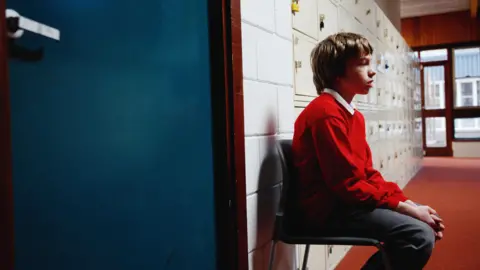School suspensions rise to nearly a million in England
 Getty Images
Getty ImagesThe number of school suspensions and exclusions in England has reached its highest level since 2006, Department for Education figures show.
There were 954,952 suspensions in state schools in 2023/24 - a 21% increase on the previous year - while exclusions also rose 16% to 10,885.
While secondary school pupils comprised most suspensions, more than 100,000 were primary age - a number that has grown significantly.
A suspended pupil must stay out of school for a fixed period of up to 45 days per school year, while those excluded are permanently removed. Individual pupils often account for more than one period of suspension.
The government says it is tackling the root causes of poor behaviour and is intensively supporting 500 schools with the worst behaviour.
Persistent disruptive behaviour was the most common reason pupils were sent home, accounting for half of all suspensions and 39% exclusions.
Nearly half of the suspensions were among pupils getting support for special educational needs - who were three times more likely to be suspended than their classmates.
Children on free school meals were also overrepresented, making up a quarter of the school population but 60% of suspensions.
Paul Whiteman, general secretary at school leaders' union NAHT, said schools alone could not address the causes of poor behaviour.
"Schools have a duty to provide a safe environment for all pupils and only use suspensions and exclusions when other options to ensure this have been exhausted," he said.
"The reasons for disruptive behaviour often lie beyond the school gates and have their roots in wider challenges, including everything from poverty to access to support with special educational needs and mental ill-health."
The vast majority of suspensions - nine in 10 - occurred at secondary schools, with Year 9 having the highest rate.
But primary-age suspensions rose too, up 24% on the previous year.
The vast majority (88%) of pupils who were excluded at primary school were getting support for special educational needs, compared with 46% of excluded secondary school pupils.
Research from charity Chance UK, which supports families of excluded children in London, suggests that 90% of children who are excluded at primary school fail to pass GCSE English and maths.
Sophie Schmal, the charity's director, said Thursday's figures revealed a "very concerning picture" - particularly the rise in primary school suspensions.
"Early intervention has to mean early. We can't wait until these children are teenagers to tackle this."
Sarah - not her real name - is a mum of one in London. Her six-year-old son was suspended several times within his first few weeks at primary school for hitting other pupils and throwing things in class.
She said that even after school staff agreed that her son showed signs of autism, he continued to be sent out of class regularly and suspended, which made him feel "isolated".
"Since he was three years old, my son has been labelled as the naughty and difficult kid when all he really needed was help," she said.
"I sought help as soon as I recognised that he needed additional support. But rather than helping me immediately, they waited until it was an emergency."
Sarah eventually managed to move her son to a different mainstream school where he is getting more support, she said.
Responding to the figures, early education minister Stephen Morgan said the Labour government had "wasted no time in tackling the root causes of poor behaviour", including offering mental health support in every school and expanding free school meals.
He pointed to its new attendance and behaviour hubs, which will directly support the 500 schools that "need the most help".
"We're also continuing to listen to parents as we reform the SEND system, while already putting in place better and earlier support for speech and language needs, ADHD and autism," Morgan added.
